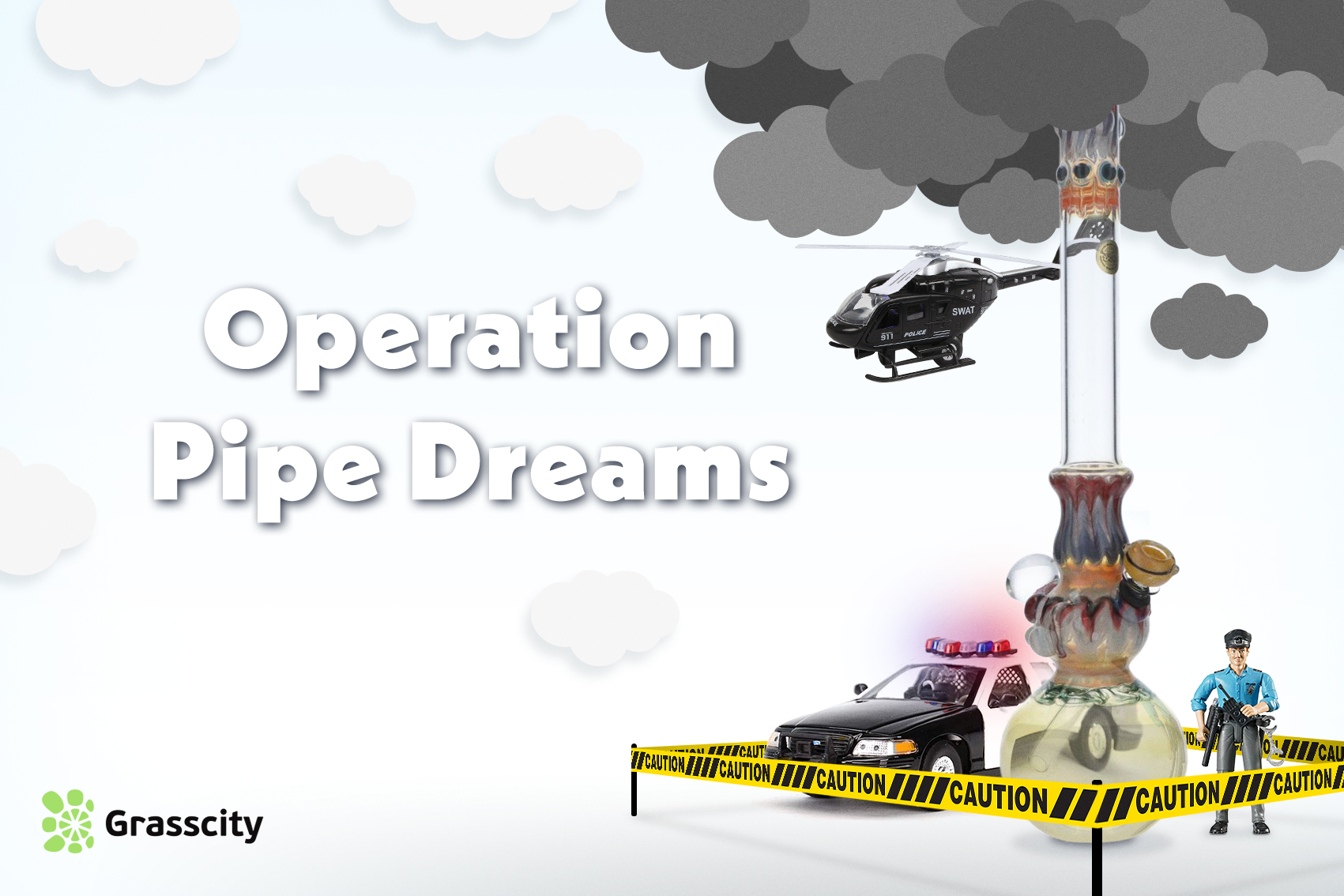
Operation Pipe Dreams
Operation Pipe Dreams was not so long ago, but still feels a world away from the smoking paraphernalia industry today. While now you can get a gorgeous designer bong or a high-end golden-plated herb vaporizer delivered right to your door, there was a time not too long ago when selling even a simple pipe could’ve landed you in jail.
Here’s the story of how in 2003, the US government raided stores and glass blowing studios, put multiple glassblowers out of business, and imprisoned Tommy Chong: a story known as Operation Pipe Dreams.
What’s “Operation Pipe Dreams”?
Operation Pipe Dreams was the code name used for an American nationwide investigation that targeted businesses selling drug paraphernalia (such as cannabis accessories) in 2003.
Although, as the name implies, they were targeting mostly bongs and cannabis pipes, that’s not everything they were after. The operation also mentioned items like roach clips, miniature spoons, and even miniature scales as “drug paraphernalia.”
If you’re thinking “Wait, bongs were illegal back then?” - you may be surprised that bongs are still technically illegal now in some states. However, marijuana pipes and other “drug paraphernalia” are prohibited under a little-used statute, meaning people rarely get prosecuted by it. That was also true in 2003, which is why multiple state law enforcement agencies didn’t want to help with the investigation.
To move forward, cases had to be filed in Pennsylvania and Iowa, where there’s a specific prohibition on using the mail delivery service to transport drug paraphernalia.
The costs of the operation? Around 12 million dollars, and the involvement of 2,000 law enforcement officers.
The legal consequences
The operation culminated in the raiding of stores (branded as “distributors”) and glass blowing studios alike. Some people, like Jason Harris, recount getting “hogtied and arrested” during a raid as early as 6 am, only realizing why upon watching the news in jail. You may know Jason Harris as one of the most renowned glassblowers out there, and former owner-operator of Jerome Baker Designs. When asked about the ordeal, Jason notes that he was singled out for his business’s size. One of the largest at the time, he believed he was made an example of, as Operation Pipe Dreams was, at its core, politically motivated.
The operation resulted in the destruction of thousands of pipes and bongs and the arrest of 55 individuals. Out of all of them, only one ended up receiving a prison sentence: actor Tommy Chong, who many of you know as one half of the comedic duo Cheech and Chong.
Tommy Chong was arrested for his involvement in Nice Dreams and in Chong Glass Works, the famous brand of glass pipes and bongs. The actor, who had never been arrested before, signed a plea bargain to declare himself guilty and serve time in federal prison to keep his wife and his son from getting arrested too. It’s worth noting that, even though the brand carries his name, it was his son Paris Chong who started the company, while Tommy provided the face and partial investment.
Although Chong Glass Works makes high-quality but fairly affordable pieces, Nice Dreams specialized in high-end, designer, collectible glass bongs. It was this store that ended up being targeted by agents working for the Drug Enforcement Administration pretending to be owners of head shops in Pennsylvania. However, the company did not sell pieces to anyone in states enforcing the distribution of drug paraphernalia statute, and consistently rejected all pressure to make the sale.
The DEA agents ended up placing a large order on out-of-stock merchandise, which was crafted but remained in the store, as no one picked it up and Paris Chong refused to ship. This was a huge blow for the federal agents, since the whole idea rested on charges of using the mail service to ship the items.
To solve this, the agents decided that there’s no better job than the one you do yourself, and became employees of the company to get the merchandise out of the shop and, well, do the illegal thing.
Can you believe this whole thing cost 12 million?'
Was Operation Pipe Dreams Effective?
Did people stop smoking weed because the government targeted a couple of brands and destroyed some bongs they themselves purchased? Unsurprisingly, no.
If apple pipes and crushed cans have taught us anything, is that cannabis enthusiasts don’t need “illegal drug paraphernalia” to smoke. That’s why many believe that Operation Pipe Dreams was less about trying to stop drug consumption, and more about a political move.
The Huffington Post quotes Sean Dunagan, a LEAD member and a former DEA intelligence research specialist, saying “...there's no questions that it was political and in fact if you read the court filings by the prosecutor in that case they make a reference to Tommy Chong's career and naming some of this movies that were mocking U.S. anti-drug efforts."
He uses that to explain how, out of 55 people who were arrested and served indictments, only Tommy Chong ended up going to federal prison.
Final Thoughts
Operation Pipe Dreams was, at best, a pipe dream itself, and, at worst, a political move that clearly aged badly. Rather than curb drug use, it simply resulted in wasted money, police efforts, and unfair arrests.
Long gone are the days in the United States when people had to worry about an “illegal bong” getting them into a scuffle with the department of justice. Instead, there are states like Colorado and California where people can order cannabis deliveries to their doors, with more and more states pushing for cannabis legalization. It may not be long before we see cannabis legalization itself becoming enshrined in federal law.
Regardless of what you end up believing about Operation Pipe Dreams, we can at least agree it’s a weird and wild story.













